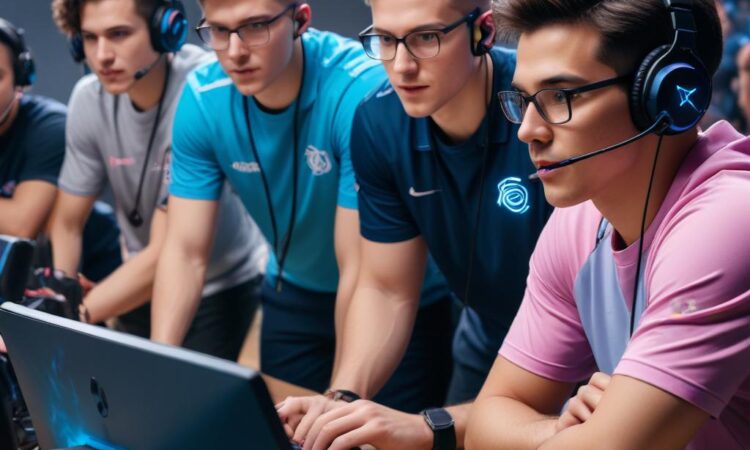The Evolution of Esports Coaching: From Strategy to Mental Health
The esports industry is evolving rapidly, and with it, the role of the esports coach is changing. Once primarily focused on strategy and in-game mechanics, coaches are now taking on a broader scope, encompassing mental health support, team dynamics, and even personal development. This shift reflects the increasing demands placed on professional esports players, and the growing awareness of the importance of holistic well-being in achieving peak performance.
From Tactics to Holistic Support: The Expanding Role of Esports Coaches
In the early days of esports, coaches were primarily tasked with developing game strategies, analyzing opponent playstyles, and optimizing team compositions. While these core responsibilities remain crucial, the modern esports coach must go beyond the tactical realm. They are now expected to be leaders, mentors, and confidants, providing comprehensive support that extends beyond the game.
Mental Health: A Cornerstone of Success
The pressure on professional esports players is immense. Intense competition, demanding schedules, and the constant scrutiny of the public eye can take a toll on mental health. Recognizing this, esports coaches are increasingly incorporating mental health support into their approach. They work with players to develop coping mechanisms for stress, anxiety, and burnout, ensuring they can perform at their best both on and off the field.
This shift towards mental health is driven by a growing understanding of the link between mental well-being and performance. Studies have shown that players with strong mental resilience are better able to handle pressure, adapt to challenges, and maintain consistent performance. This has led to the emergence of mental health specialists within esports teams, alongside traditional coaches.
Team Dynamics: Fostering Collaboration and Harmony
Beyond individual well-being, esports coaches are also responsible for fostering positive team dynamics. Creating a cohesive and supportive environment is crucial for success, as players must work together effectively to achieve their shared goals. Coaches facilitate communication, resolve conflicts, and build a sense of camaraderie within the team, ensuring that everyone feels valued and supported.
The importance of team dynamics is amplified in esports, where success hinges on the collaborative efforts of multiple players. Coaches play a vital role in building trust, respect, and mutual understanding among teammates, creating an environment conducive to optimal performance.
Embracing Personal Development: Beyond the Game
The evolution of esports coaching extends beyond the arena of gameplay and mental health. Modern coaches recognize the importance of personal development, supporting players in areas such as time management, financial literacy, and public speaking. These skills are crucial for players to navigate the demands of professional esports, ensuring their success both within and beyond the game.
By fostering well-rounded individuals, esports coaches empower players to become ambassadors for their sport, contributing positively to the industry’s growth and development. This holistic approach goes beyond simply winning tournaments, recognizing the broader impact that professional esports players have on the community.
The Challenges and Opportunities of Modern Esports Coaching
While the evolving role of esports coaches offers numerous benefits, it also presents unique challenges. The pressure to achieve success, coupled with the increasing demands on players, requires coaches to be highly skilled and adaptable. They must possess a diverse skillset, including game expertise, mental health knowledge, and effective communication skills.
Navigating the Complexity of the Esports Landscape
The rapid growth and evolving landscape of esports make it a dynamic and challenging environment for coaches. New games emerge, meta-shifts occur, and technology constantly advances, requiring coaches to constantly learn and adapt. They must be able to stay abreast of the latest trends, analyze game data, and develop effective strategies in a rapidly changing environment.
Building Trust and Respect: A Foundation for Success
Developing strong relationships with players is critical for esports coaches. They must foster trust, respect, and open communication, creating an environment where players feel comfortable seeking support and guidance. Building these relationships requires empathy, active listening, and a genuine desire to help players reach their full potential.
The Future of Esports Coaching: Embracing the Challenge
The future of esports coaching is bright, filled with exciting opportunities for innovation and growth. As the industry continues to evolve, coaches will play an even more crucial role in shaping the future of competitive gaming. By embracing a holistic approach that encompasses mental health, team dynamics, and personal development, esports coaches can empower players to achieve success both within and beyond the game.
The evolution of esports coaching is a testament to the industry’s commitment to fostering well-rounded individuals and maximizing performance. By recognizing the importance of holistic well-being, esports coaches are not only shaping the future of competitive gaming but also contributing to the growth and development of esports as a whole.

